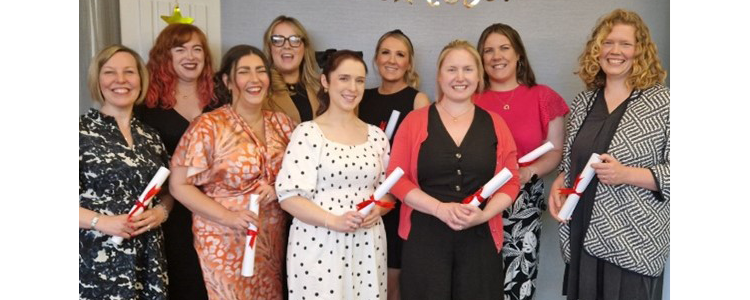FNP Scotland celebrating a first in family nurse education

FNP Scotland celebrating a first in family nurse education
NES marked the first graduation of family nurses from the Professional Diploma in Family Nursing on Thursday 13 June.
Background
The Family Nurse Partnership (FNP) was developed at the University of Colorado, Denver, USA, where it is known as the Nurse-Family Partnership. Over 40 years of research, the programme has been shown to produce many benefits, including improved early language acquisition, reduction in child injury and neglect and an increased involvement of fathers.
FNP Scotland is a licenced socio-educative programme provided for young, first-time parents across mainland NHS Boards. Family nurses engage their clients within the programme while the client is in early pregnancy and undertake up to 64 scheduled, intensive home visits over a period of approximately 30 months.
Family nurse education has been developed and facilitated in Scotland since 2015. Prior to this, colleagues in NHS England provided education to family nurses and supervisors.
Since its inception family nurses and supervisors in Scotland reflected positively on the high standard of education provided and the importance of education in facilitating the FNP programme with clients.
The education team were frequently asked why there was no academic award for the education. They responded by undertaking years of preparation and planning to provide an opportunity for family nurses to undertake a credit rated programme.
Professional Diploma in Family Nursing
On 22 February 2022 the Scottish Qualifications Authority (SQA) approved the FNP education programme to offer the Professional Diploma in Family Nursing. The award is at Masters level (Scottish Credit and Qualifications Framework (SCQF) Level 11).
The FNP education programme is mandatory for all new family nurses and since September 2022, new nurses have a choice to study for this academic award. Diploma candidates undertake about 4 to 6 hours of additional personal study each week and complete five assessments over the 18-month programme.
The candidates capture some of their clinical work alongside their academic assessments in a portfolio on TURAS, which is NHS Scotland’s digital learning platform. On successful completion, the candidate is awarded the Professional Diploma in Family Nursing with 60 Masters level points (SCQF level 11) which can be utilised to support future academic endeavours.
Reflections from graduates
The group of eleven graduates, 10 from Scotland and one from Northern Ireland should be commended for undertaking this new award as they transitioned into a new post.
Following their graduation we asked for some reflections:
“So I think I definitely got something out of every assignment I did, and I enjoyed that process of reading around certain subjects and learning a bit more and just the process of writing down your thoughts and reflecting made me think more deeply especially about things like supervision and my supervision is better now because of that, on the programme.”
“I’ve noticed with doing the course that it makes more sense of your practice, knowing the theory and looking deeper into why it’s used and how it’s used is making a difference into how I practice because I now understand the rationale for everything I am doing.”
Reflections from an FNP supervisor
“An integral element of the FNP Supervisor role and as custodian of the FNP License, is to carry out accompanied home visits with Family Nurses to their clients a minimum of 3 times per year. Through supervising two Family Nurses who were progressing the Professional Diploma I started to notice positive differences in the development and integration of advanced practice tools at visits.
“This emerged in a number of ways; I found myself reflecting on historical observations I had made at previous home visits with Family Nurses prior to the Professional Diploma being introduced and I also found myself reflecting on my own previous practice as a Family Nurse. I was noticing more structure to visit preparation and a deeper intentionality to reflective practice which appeared to be created through the academic activities and professional portfolio that were incorporated into the diploma. Crucially, I was observing expert honing of advanced practice tools in way I had never observed before in a Family Nurse’s learning journey.”

For further information, please contact The FNP Professional Diploma inbox
August, 20 2024
